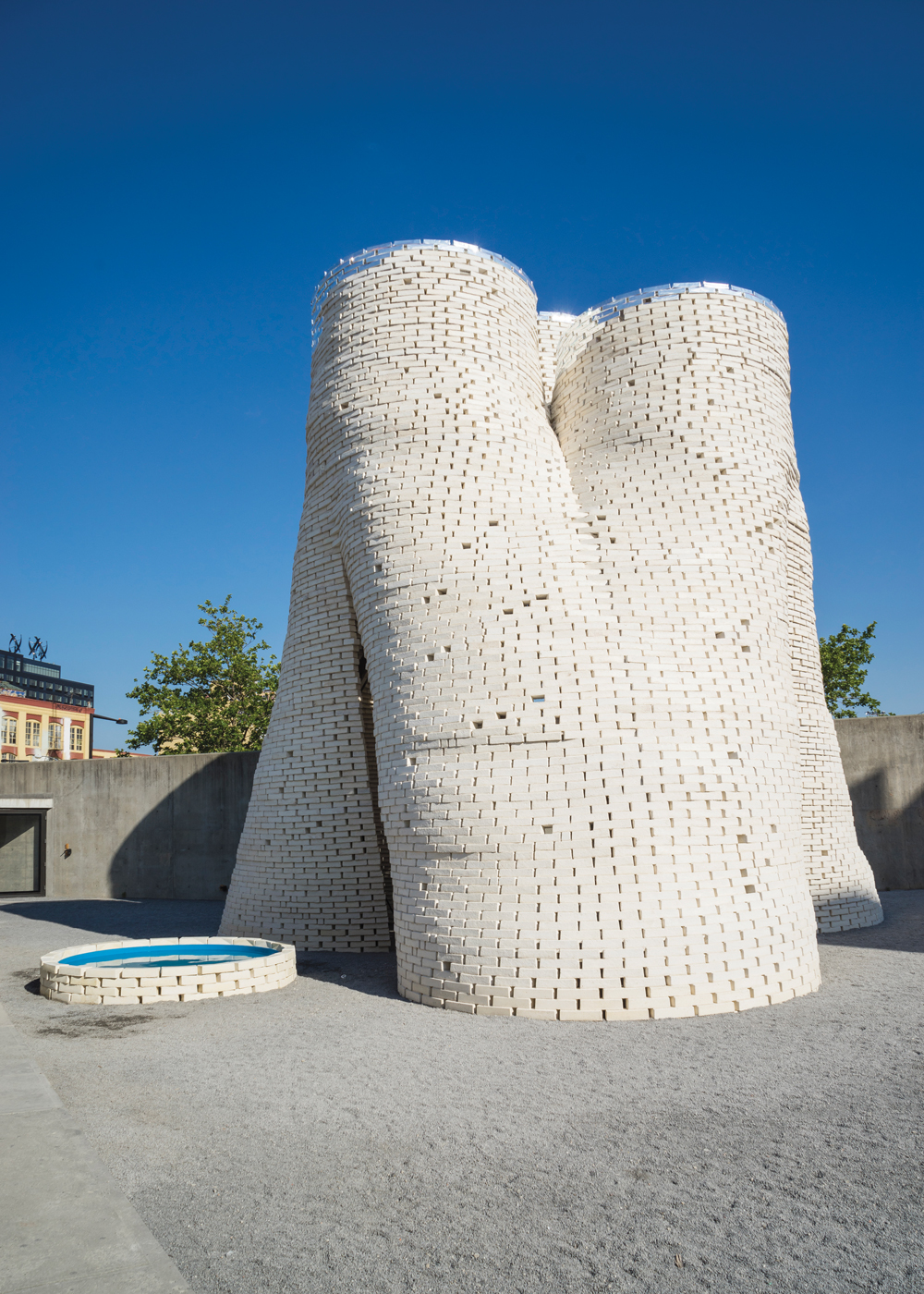Since its launch in 2007, New York-based Ecovative Design has garnered a lot of attention for creating building and packaging materials with low-carbon footprints by mixing agricultural waste with mushroom-derived mycelium. Instead of ending up in landfills, these materials can be composted and reused as soil nutrient.
Last summer, Ecovative Design applied its cradle-to-cradle process to produce 10,000 organic bricks that were used to build Hy-Fi, a three-tower structure that was installed in the courtyard of the Museum of Modern Art’s PS1 site in Long Island City, N.Y. Ecovative was assisted by architect David Benjamin of The Living design studio (acquired by Autodesk in July), structural engineer Arup, environmental engineer Atelier Ten, and SCAPE Landscape Architecture.
Sam Harrington, Ecovative’s Building Products Manager, says the bricks were made by combining chopped corn stalks with specially formulated mycelium. The mixture was packed into molds—which can be of any shape—where it self-assembled and solidified into a lightweight, low-cost object. The molds, made from reflective plastic supplied by 3M, were used (with bricks inside them) to accent the tops of the towers. The towers were demolished in September, and the bricks were composted.
Harrington says the lifespan of these organic materials, which Ecovative has dubbed “Myco Foam,” is similar to that of softwood. “If untreated Myco Foam (in the shape of a brick, or anything else) is kept dry and clean within a building assembly, it will last indefinitely. If it’s chipped into small bits, and mixed with moisture and active soil biota, it will compost in a few months.”
Harrington says Ecovative Design’s primary focus is to use ag waste to make rigid-board insulation.
Read about more innovations from BD+C's 2014 Great Solutions Report
Related Stories
Healthcare Facilities | Dec 19, 2023
A new hospital in Duluth, Minn., is now the region’s largest healthcare facility
In Duluth, Minn., the new St. Mary’s Medical Center, designed by EwingCole, is now the largest healthcare facility in the region. The hospital consolidates Essentia Health’s healthcare services under one roof. At about 1 million sf spanning two city blocks, St. Mary’s overlooks Lake Superior, providing views on almost every floor of the world’s largest freshwater lake.
Government Buildings | Dec 19, 2023
New Pennsylvania State Archives building holds documents dating back to 1680
Work was recently completed on a new Pennsylvania State Archives building in Harrisburg, Penn. The HGA-designed, 146,000-sf facility offers numerous amenities, including computers, scanners, printers, a kitchenette with seating, lockers, a meeting room, a classroom, an interactive video wall, gallery, and all-gender restrooms. The features are all intended to provide a welcoming and comfortable environment for visitors.
Urban Planning | Dec 18, 2023
The impacts of affordability, remote work, and personal safety on urban life
Data from Gensler's City Pulse Survey shows that although people are satisfied with their city's experience, it may not be enough.
MFPRO+ News | Dec 18, 2023
Berkeley, Calif., raises building height limits in downtown area
Facing a severe housing shortage, the City of Berkeley, Calif., increased the height limits on residential buildings to 12 stories in the area close to the University of California campus.
Green | Dec 18, 2023
Class B commercial properties gain more from LEED certification than Class A buildings
Class B office properties that are LEED certified command a greater relative benefit than LEED-certified Class A buildings, according to analysis from CBRE. The Class B LEED rent advantage over non-LEED is about three times larger than the premium earned by Class A LEED buildings.
Codes and Standards | Dec 18, 2023
ASHRAE releases guide on grid interactivity in the decarbonization process
A guide focusing on the critical role of grid interactivity in building decarbonization was recently published by ASHRAE. The Grid-Interactive Buildings for Decarbonization: Design and Operation Resource Guide provides information on maximizing carbon reduction through buildings’ interaction with the electric power grid.
Architects | Dec 18, 2023
Perkins&Will’s new PRECEDE tool provides access to public health data to inform design decisions
Perkins&Will recently launched a free digital resource that allows architects and designers to access key public health data to inform design decisions. The “Public Repository to Engage Community and Enhance Design Equity,” or PRECEDE, centralizes demographic, environmental, and health data from across the U.S. into a geospatial database.
Sports and Recreational Facilities | Dec 15, 2023
San Antonio Spurs’ new practice facility aims to help players win championships and maintain well-being
Designed by ZGF, the Victory Capital Performance Center uses biophilic design to promote better health and wellness on and off the court.
Affordable Housing | Dec 14, 2023
What's next for affordable housing in 2024?
As 2023 draws to a close, GBBN’s Mary Jo Minerich and Amanda Markovic, AIA sat down to talk about the future. What’s next in terms of trends, technology, and construction of affordable housing?
75 Top Building Products | Dec 13, 2023
75 top building products for 2023
From a bladeless rooftop wind energy system, to a troffer light fixture with built-in continuous visible light disinfection, innovation is plentiful in Building Design+Construction's annual 75 Top Products report.

















